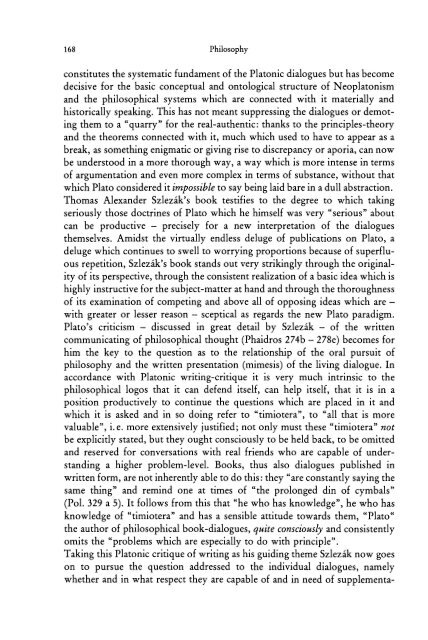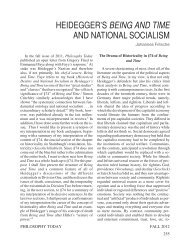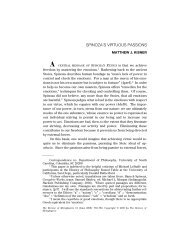Plato and the Written Quality of Philosophy. Interpretations of the ...
Plato and the Written Quality of Philosophy. Interpretations of the ...
Plato and the Written Quality of Philosophy. Interpretations of the ...
You also want an ePaper? Increase the reach of your titles
YUMPU automatically turns print PDFs into web optimized ePapers that Google loves.
168 <strong>Philosophy</strong><br />
constitutes <strong>the</strong> systematic fundament <strong>of</strong> <strong>the</strong> <strong>Plato</strong>nic dialogues but has become<br />
decisive for <strong>the</strong> basic conceptual <strong>and</strong> ontological structure <strong>of</strong> Neoplatonism<br />
<strong>and</strong> <strong>the</strong> philosophical systems which are connected with it materially <strong>and</strong><br />
historically speaking. This has not meant suppressing <strong>the</strong> dialogues or demoting<br />
<strong>the</strong>m to a "quarry" for <strong>the</strong> real-au<strong>the</strong>ntic: thanks to <strong>the</strong> principles-<strong>the</strong>ory<br />
<strong>and</strong> <strong>the</strong> <strong>the</strong>orems connected with it, much which used to have to appear as a<br />
break, as something enigmatic or giving rise to discrepancy or aporia, can now<br />
be understood in a more thorough way, a way which is more intense in terms<br />
<strong>of</strong> argumentation <strong>and</strong> even more complex in terms <strong>of</strong> substance, without that<br />
which <strong>Plato</strong> considered it impossible to say being laid bare in a dull abstraction.<br />
Thomas Alex<strong>and</strong>er Szlezik's book testifies to <strong>the</strong> degree to which taking<br />
seriously those doctrines <strong>of</strong> <strong>Plato</strong> which he himself was very "serious" about<br />
can be productive - precisely for a new interpretation <strong>of</strong> <strong>the</strong> dialogues<br />
<strong>the</strong>mselves. Amidst <strong>the</strong> virtually endless deluge <strong>of</strong> publications on <strong>Plato</strong>, a<br />
deluge which continues to swell to worrying proportions because <strong>of</strong> superfluous<br />
repetition, Szlezik's book st<strong>and</strong>s out very strikingly through <strong>the</strong> originality<br />
<strong>of</strong> its perspective, through <strong>the</strong> consistent realization <strong>of</strong> a basic idea which is<br />
highly instructive for <strong>the</strong> subject-matter at h<strong>and</strong> <strong>and</strong> through <strong>the</strong> thoroughness<br />
<strong>of</strong> its examination <strong>of</strong> competing <strong>and</strong> above all <strong>of</strong> opposing ideas which are -<br />
with greater or lesser reason - sceptical as regards <strong>the</strong> new <strong>Plato</strong> paradigm.<br />
<strong>Plato</strong>'s criticism - discussed in great detail by Szlezik - <strong>of</strong> <strong>the</strong> written<br />
communicating <strong>of</strong> philosophical thought (Phaidros 274b - 278e) becomes for<br />
him <strong>the</strong> key to <strong>the</strong> question as to <strong>the</strong> relationship <strong>of</strong> <strong>the</strong> oral pursuit <strong>of</strong><br />
philosophy <strong>and</strong> <strong>the</strong> written presentation (mimesis) <strong>of</strong> <strong>the</strong> living dialogue. In<br />
accordance with <strong>Plato</strong>nic writing-critique it is very much intrinsic to <strong>the</strong><br />
philosophical logos that it can defend itself, can help itself, that it is in a<br />
position productively to continue <strong>the</strong> questions which are placed in it <strong>and</strong><br />
which it is asked <strong>and</strong> in so doing refer to "timiotera", to "all that is more<br />
valuable", i. e. more extensively justified; not only must <strong>the</strong>se "timiotera" not<br />
be explicitly stated, but <strong>the</strong>y ought consciously to be held back, to be omitted<br />
<strong>and</strong> reserved for conversations with real friends who are capable <strong>of</strong> underst<strong>and</strong>ing<br />
a higher problem-level. Books, thus also dialogues published in<br />
written form, are not inherently able to do this: <strong>the</strong>y "are constantly saying <strong>the</strong><br />
same thing" <strong>and</strong> remind one at times <strong>of</strong> "<strong>the</strong> prolonged din <strong>of</strong> cymbals"<br />
(Pol. 329 a 5). It follows from this that "he who has knowledge", he who has<br />
knowledge <strong>of</strong> "timiotera" <strong>and</strong> has a sensible attitude towards <strong>the</strong>m, "<strong>Plato</strong>"<br />
<strong>the</strong> author <strong>of</strong> philosophical book-dialogues, quite consciously <strong>and</strong> consistently<br />
omits <strong>the</strong> "problems which are especially to do with principle".<br />
Taking this <strong>Plato</strong>nic critique <strong>of</strong> writing as his guiding <strong>the</strong>me Szlezik now goes<br />
on to pursue <strong>the</strong> question addressed to <strong>the</strong> individual dialogues, namely<br />
whe<strong>the</strong>r <strong>and</strong> in what respect <strong>the</strong>y are capable <strong>of</strong> <strong>and</strong> in need <strong>of</strong> supplementa-
















